The Cambridge History of China. Vol. 12: Republican China, 1912-1949, Part 1
Подождите немного. Документ загружается.

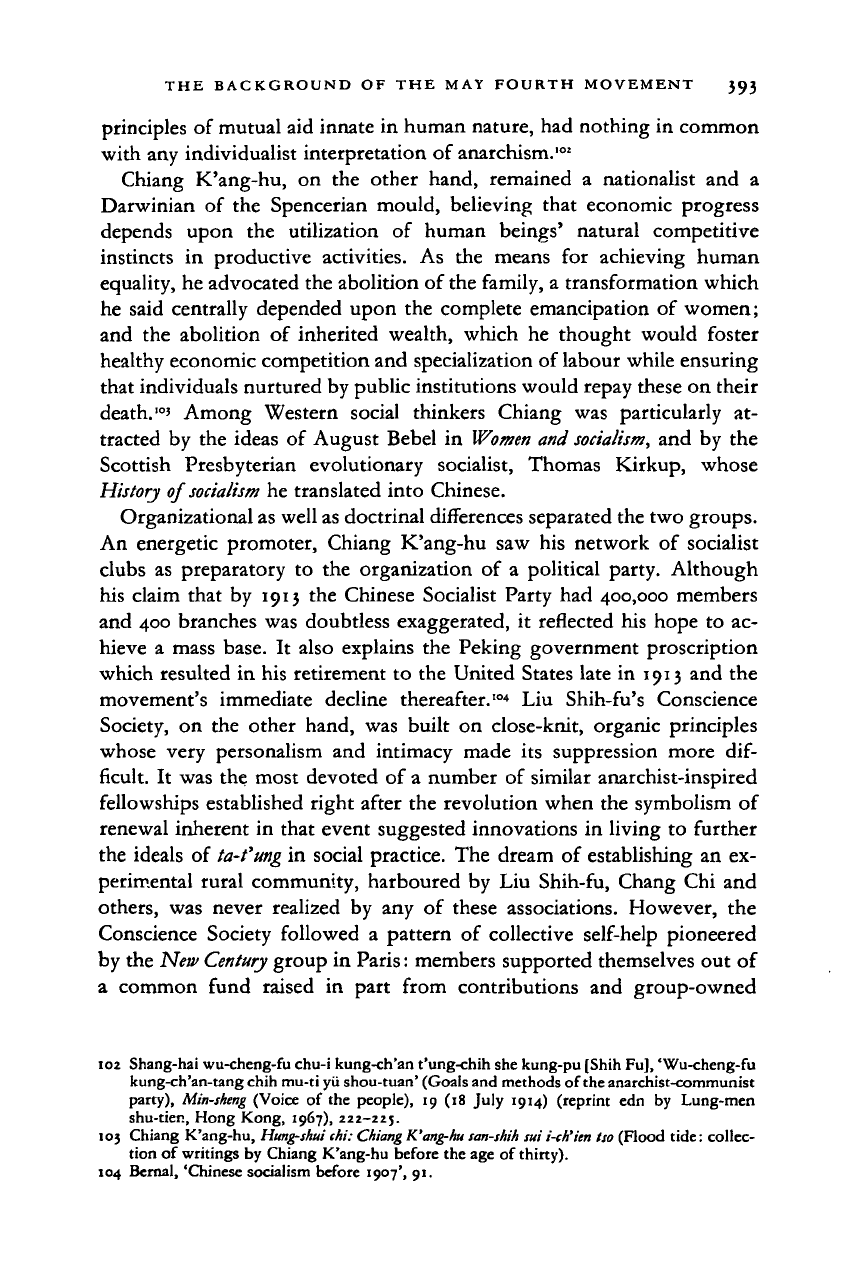
THE BACKGROUND OF THE MAY FOURTH MOVEMENT 393
principles of mutual aid innate in human nature, had nothing in common
with any individualist interpretation of anarchism.
102
Chiang K'ang-hu, on the other hand, remained a nationalist and a
Darwinian of the Spencerian mould, believing that economic progress
depends upon the utilization of human beings' natural competitive
instincts in productive activities. As the means for achieving human
equality, he advocated the abolition of the family, a transformation which
he said centrally depended upon the complete emancipation of women;
and the abolition of inherited wealth, which he thought would foster
healthy economic competition and specialization of labour while ensuring
that individuals nurtured by public institutions would repay these on their
death.
10
' Among Western social thinkers Chiang was particularly at-
tracted by the ideas of August Bebel in
Women and
socialism,
and by the
Scottish Presbyterian evolutionary socialist, Thomas Kirkup, whose
History
of
socialism
he translated into Chinese.
Organizational as well as doctrinal differences separated the two groups.
An energetic promoter, Chiang K'ang-hu saw his network of socialist
clubs as preparatory to the organization of a political party. Although
his claim that by 1913 the Chinese Socialist Party had 400,000 members
and 400 branches was doubtless exaggerated, it reflected his hope to ac-
hieve a mass base. It also explains the Peking government proscription
which resulted in his retirement to the United States late in 1913 and the
movement's immediate decline thereafter.
104
Liu Shih-fu's Conscience
Society, on the other hand, was built on close-knit, organic principles
whose very personalism and intimacy made its suppression more dif-
ficult. It was the most devoted of a number of similar anarchist-inspired
fellowships established right after the revolution when the symbolism of
renewal inherent in that event suggested innovations in living to further
the ideals of
ta-t'ung
in social practice. The dream of establishing an ex-
perimental rural community, harboured by Liu Shih-fu, Chang Chi and
others, was never realized by any of these associations. However, the
Conscience Society followed a pattern of collective self-help pioneered
by the New
Century
group in Paris: members supported themselves out of
a common fund raised in part from contributions and group-owned
102 Shang-hai wu-cheng-fu chu-i kung-ch'an t'ung-chih she kung-pu [Shih Fu], 'Wu-cheng-fu
kung-ch'an-tang chih mu-ti yii shou-tuan' (Goals and methods of the anarchist-communist
party),
Min-sheng
(Voice of the people), 19 (18 July 1914) (reprint edn by Lung-men
shu-tien, Hong Kong, 1967), 222-225.
103 Chiang K'ang-hu,
Himg-shui
chi:
Chiang
K'ang-hu
san-shih
mi
i-ch'ien
tso (Flood tide: collec-
tion of writings by Chiang K'ang-hu before the age of thirty).
104 Bernal, 'Chinese socialism before 1907', 91.
Cambridge Histories Online © Cambridge University Press, 2008
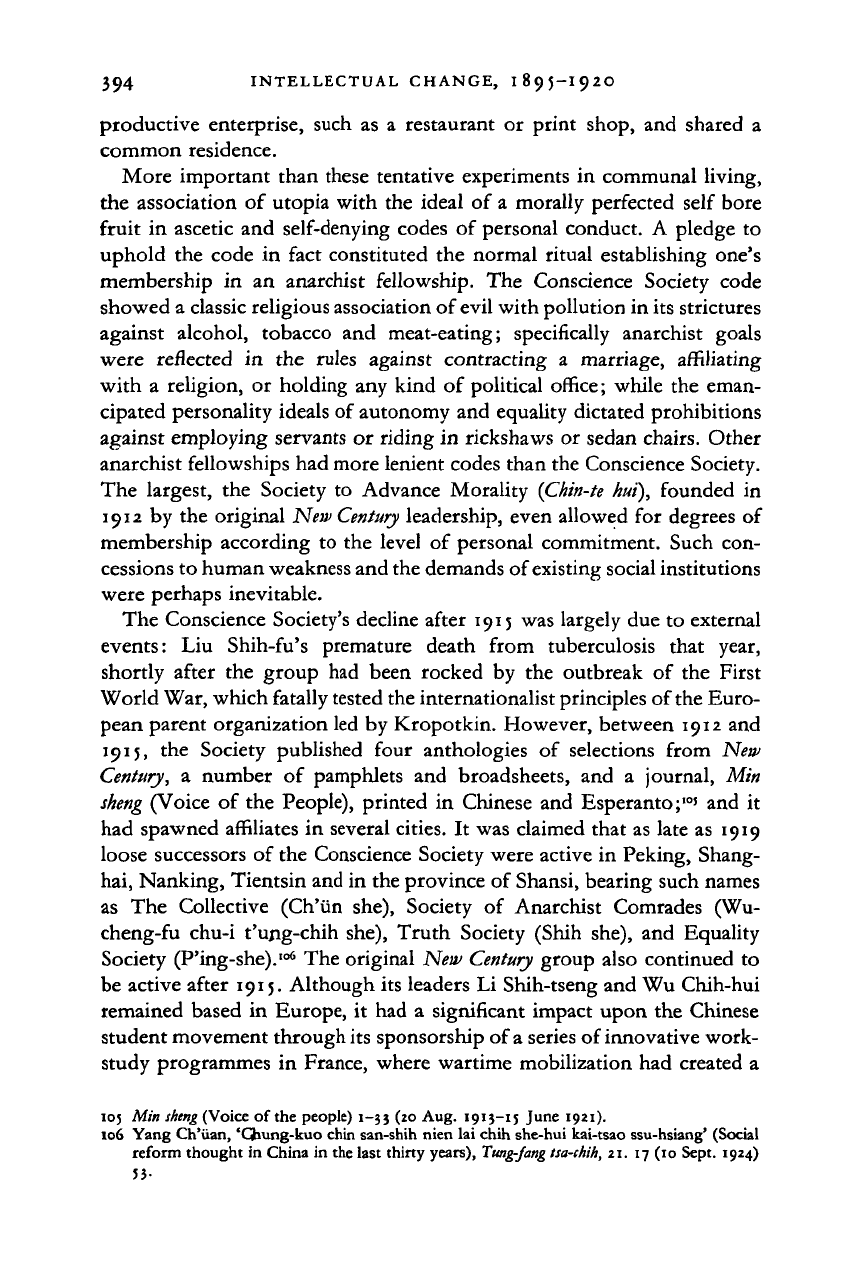
394 INTELLECTUAL CHANGE, 1895-I92O
productive enterprise, such
as a
restaurant
or
print shop, and shared
a
common residence.
More important than these tentative experiments
in
communal living,
the association
of
utopia with the ideal of a morally perfected self bore
fruit
in
ascetic and self-denying codes
of
personal conduct.
A
pledge
to
uphold the code
in
fact constituted the normal ritual establishing one's
membership
in an
anarchist fellowship.
The
Conscience Society code
showed a classic religious association of evil with pollution in its strictures
against alcohol, tobacco
and
meat-eating; specifically anarchist goals
were reflected
in the
rules against contracting
a
marriage, affiliating
with
a
religion,
or
holding any kind
of
political office; while the eman-
cipated personality ideals of autonomy and equality dictated prohibitions
against employing servants
or
riding in rickshaws or sedan chairs. Other
anarchist fellowships had more lenient codes than the Conscience Society.
The largest,
the
Society
to
Advance Morality
{Chin-te
hut), founded
in
1912 by the original New
Century
leadership, even allowed for degrees of
membership according to the level
of
personal commitment. Such con-
cessions to human weakness and the demands of existing social institutions
were perhaps inevitable.
The Conscience Society's decline after 1915 was largely due to external
events:
Liu
Shih-fu's premature death from tuberculosis that year,
shortly after
the
group had been rocked
by the
outbreak
of
the First
World War, which fatally tested the internationalist principles of the Euro-
pean parent organization led by Kropotkin. However, between 1912 and
1915,
the
Society published four anthologies
of
selections from New
Century,
a
number
of
pamphlets
and
broadsheets,
and a
journal, Min
sheng
(Voice
of
the People), printed
in
Chinese and Esperanto;
10
' and
it
had spawned affiliates in several cities.
It
was claimed that as late as 1919
loose successors of the Conscience Society were active in Peking, Shang-
hai,
Nanking, Tientsin and in the province of Shansi, bearing such names
as
The
Collective (Ch'iin she), Society
of
Anarchist Comrades (Wu-
cheng-fu chu-i t'urig-chih she), Truth Society (Shih she), and Equality
Society (P'ing-she).
106
The original New
Century
group also continued
to
be active after 1915. Although its leaders Li Shih-tseng and Wu Chih-hui
remained based
in
Europe,
it
had
a
significant impact upon the Chinese
student movement through its sponsorship of a series of innovative work-
study programmes
in
France, where wartime mobilization had created
a
105 Min
sheng
(Voice of the people) 1-33 (20 Aug. 1913-15 June 1921).
106 Yang Ch'iian, 'Cfcung-kuo chin san-shih nien lai chih she-hui kai-tsao ssu-hsiang' (Social
reform thought in China in the last thirty years),
Tung-fang
tsa-thih,
21. 17 (10 Sept. 1924)
5J-
Cambridge Histories Online © Cambridge University Press, 2008
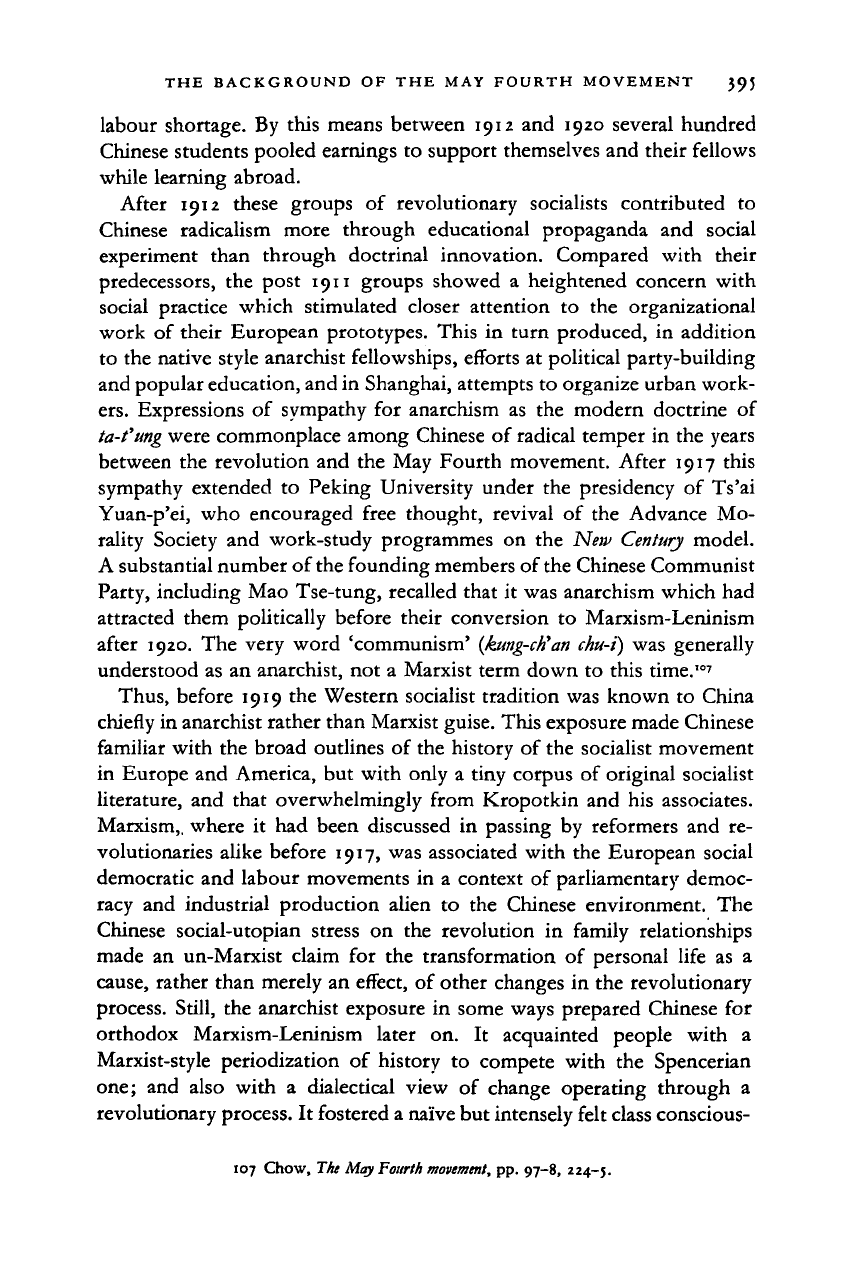
THE BACKGROUND OF THE MAY FOURTH MOVEMENT 395
labour shortage. By this means between 1912 and 1920 several hundred
Chinese students pooled earnings to support themselves and their fellows
while learning abroad.
After 1912 these groups of revolutionary socialists contributed to
Chinese radicalism more through educational propaganda and social
experiment than through doctrinal innovation. Compared with their
predecessors, the post 1911 groups showed a heightened concern with
social practice which stimulated closer attention to the organizational
work of their European prototypes. This in turn produced, in addition
to the native style anarchist fellowships, efforts at political party-building
and popular education, and in Shanghai, attempts to organize urban work-
ers.
Expressions of sympathy for anarchism as the modern doctrine of
ta-t'ung
were commonplace among Chinese of radical temper in the years
between the revolution and the May Fourth movement. After 1917 this
sympathy extended to Peking University under the presidency of Ts'ai
Yuan-p'ei, who encouraged free thought, revival of the Advance Mo-
rality Society and work-study programmes on the New
Century
model.
A substantial number of the founding members of the Chinese Communist
Party, including Mao Tse-tung, recalled that it was anarchism which had
attracted them politically before their conversion to Marxism-Leninism
after 1920. The very word 'communism'
(kung-ch
y
an chu-i)
was generally
understood as an anarchist, not a Marxist term down to this time.
107
Thus,
before 1919 the Western socialist tradition was known to China
chiefly in anarchist rather than Marxist guise. This exposure made Chinese
familiar with the broad outlines of the history of the socialist movement
in Europe and America, but with only a tiny corpus of original socialist
literature, and that overwhelmingly from Kropotkin and his associates.
Marxism,, where it had been discussed in passing by reformers and re-
volutionaries alike before 1917, was associated with the European social
democratic and labour movements in a context of parliamentary democ-
racy and industrial production alien to the Chinese environment. The
Chinese social-utopian stress on the revolution in family relationships
made an un-Marxist claim for the transformation of personal life as a
cause, rather than merely an effect, of other changes in the revolutionary
process. Still, the anarchist exposure in some ways prepared Chinese for
orthodox Marxism-Leninism later on. It acquainted people with a
Marxist-style periodization of history to compete with the Spencerian
one;
and also with a dialectical view of change operating through a
revolutionary process. It fostered a naive but intensely felt class conscious-
107 Chow,
The
May
Fourth
movement,
pp. 97-8, 224-5.
Cambridge Histories Online © Cambridge University Press, 2008
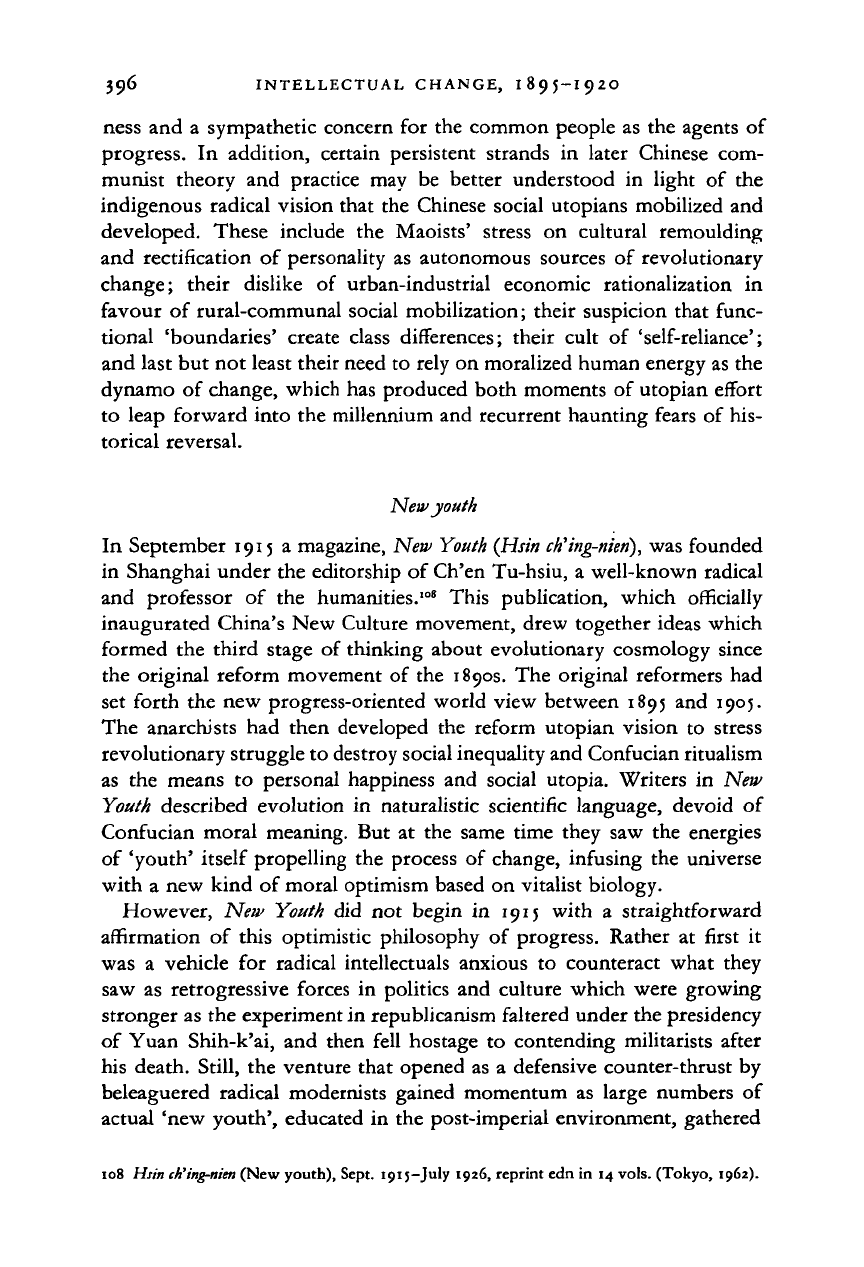
396 INTELLECTUAL CHANGE, 1895-I92O
ness and
a
sympathetic concern for the common people as the agents
of
progress.
In
addition, certain persistent strands
in
later Chinese com-
munist theory
and
practice may
be
better understood
in
light
of the
indigenous radical vision that the Chinese social Utopians mobilized and
developed. These include
the
Maoists' stress
on
cultural remoulding
and rectification
of
personality as autonomous sources
of
revolutionary
change; their dislike
of
urban-industrial economic rationalization
in
favour
of
rural-communal social mobilization; their suspicion that func-
tional 'boundaries' create class differences; their cult
of
'self-reliance';
and last but not least their need to rely on moralized human energy as the
dynamo
of
change, which has produced both moments of Utopian effort
to leap forward into the millennium and recurrent haunting fears
of
his-
torical reversal.
New youth
In September 1915
a
magazine, New
Youth {Hsin
ch'ing-nieri),
was founded
in Shanghai under the editorship
of
Ch'en Tu-hsiu,
a
well-known radical
and professor
of the
humanities.
108
This publication, which officially
inaugurated China's New Culture movement, drew together ideas which
formed the third stage
of
thinking about evolutionary cosmology since
the original reform movement
of
the 1890s. The original reformers had
set forth the new progress-oriented world view between 1895 and 1905.
The anarchists had then developed the reform Utopian vision
to
stress
revolutionary struggle to destroy social inequality and Confucian ritualism
as
the
means
to
personal happiness and social Utopia. Writers
in
New
Youth described evolution
in
naturalistic scientific language, devoid
of
Confucian moral meaning. But
at
the same time they saw the energies
of 'youth' itself propelling the process
of
change, infusing the universe
with
a
new kind of moral optimism based on vitalist biology.
However, New Youth did
not
begin
in
1915 with
a
straightforward
affirmation
of
this optimistic philosophy
of
progress. Rather
at
first
it
was
a
vehicle
for
radical intellectuals anxious
to
counteract what they
saw
as
retrogressive forces
in
politics and culture which were growing
stronger as the experiment in republicanism faltered under the presidency
of Yuan Shih-k'ai, and then fell hostage
to
contending militarists after
his death. Still, the venture that opened as
a
defensive counter-thrust by
beleaguered radical modernists gained momentum
as
large numbers
of
actual 'new youth', educated
in
the post-imperial environment, gathered
108 Hsin
ch'ing-nien
(New youth), Sept. 1915-July 1926, reprint edn in 14 vols. (Tokyo, 1962).
Cambridge Histories Online © Cambridge University Press, 2008
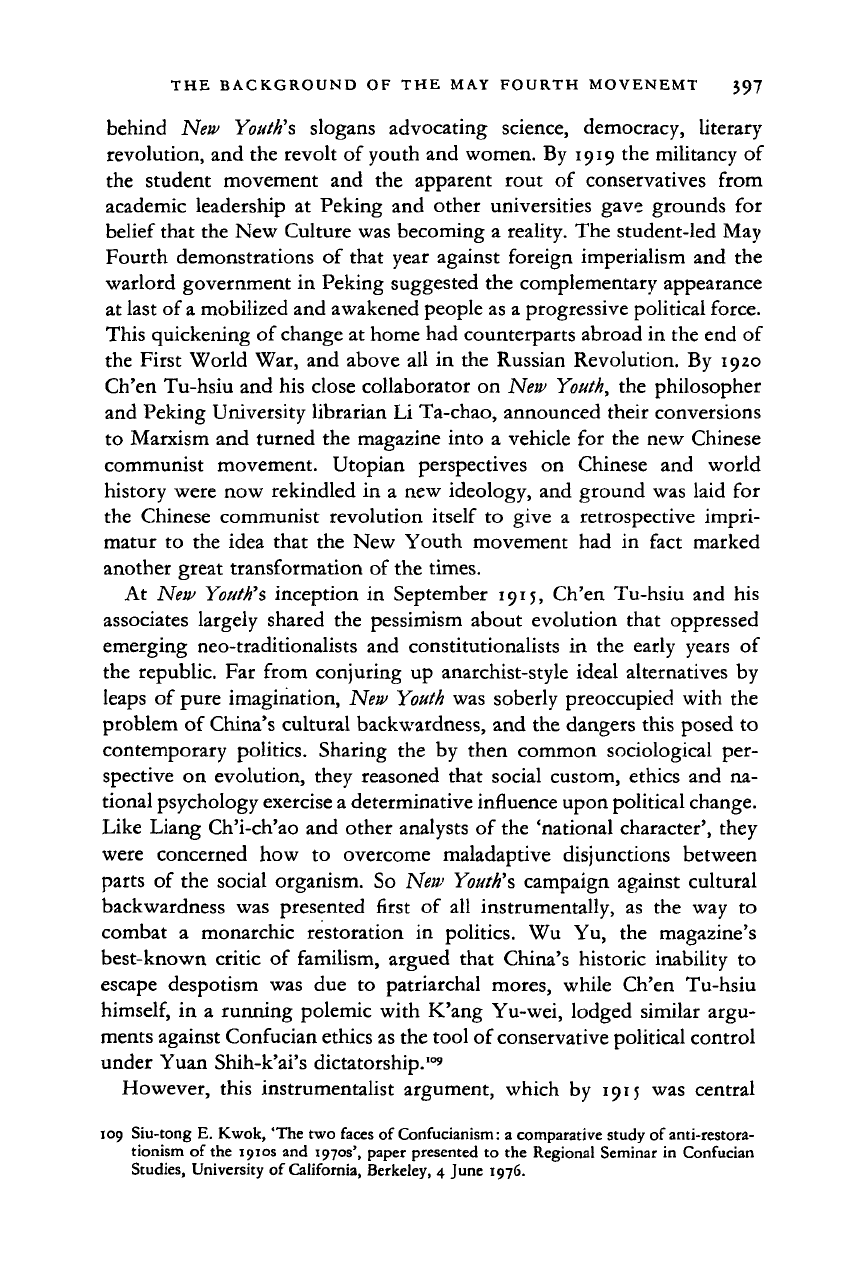
THE BACKGROUND OF THE MAY FOURTH MOVENEMT 397
behind New Youth's slogans advocating science, democracy, literary
revolution, and the revolt of youth and women. By 1919 the militancy of
the student movement and the apparent rout of conservatives from
academic leadership at Peking and other universities gave grounds for
belief that the New Culture was becoming a reality. The student-led May
Fourth demonstrations of that year against foreign imperialism and the
warlord government in Peking suggested the complementary appearance
at last of
a
mobilized and awakened people as a progressive political force.
This quickening of change at home had counterparts abroad in the end of
the First World War, and above all in the Russian Revolution. By 1920
Ch'en Tu-hsiu and his close collaborator on New Youth, the philosopher
and Peking University librarian Li Ta-chao, announced their conversions
to Marxism and turned the magazine into a vehicle for the new Chinese
communist movement. Utopian perspectives on Chinese and world
history were now rekindled in a new ideology, and ground was laid for
the Chinese communist revolution itself to give a retrospective impri-
matur to the idea that the New Youth movement had in fact marked
another great transformation of the times.
At New Youth's inception in September 1915, Ch'en Tu-hsiu and his
associates largely shared the pessimism about evolution that oppressed
emerging neo-traditionalists and constitutionalists in the early years of
the republic. Far from conjuring up anarchist-style ideal alternatives by
leaps of pure imagination, New Youth was soberly preoccupied with the
problem of China's cultural backwardness, and the dangers this posed to
contemporary politics. Sharing the by then common sociological per-
spective on evolution, they reasoned that social custom, ethics and na-
tional psychology exercise a determinative influence upon political change.
Like Liang Ch'i-ch'ao and other analysts of the 'national character', they
were concerned how to overcome maladaptive disjunctions between
parts of the social organism. So New Youth's campaign against cultural
backwardness was presented first of all instrumentally, as the way to
combat a monarchic restoration in politics. Wu Yu, the magazine's
best-known critic of familism, argued that China's historic inability to
escape despotism was due to patriarchal mores, while Ch'en Tu-hsiu
himself,
in a running polemic with K'ang Yu-wei, lodged similar argu-
ments against Confucian ethics as the tool of conservative political control
under Yuan Shih-k'ai's dictatorship.
109
However, this instrumentalist argument, which by 1915 was central
109 Siu-tong E. Kwok, "The two faces of Confucianism: a comparative study of anti-restora-
tionism of the 1910s and 1970s', paper presented to the Regional Seminar in Confucian
Studies, University of California, Berkeley, 4 June 1976.
Cambridge Histories Online © Cambridge University Press, 2008
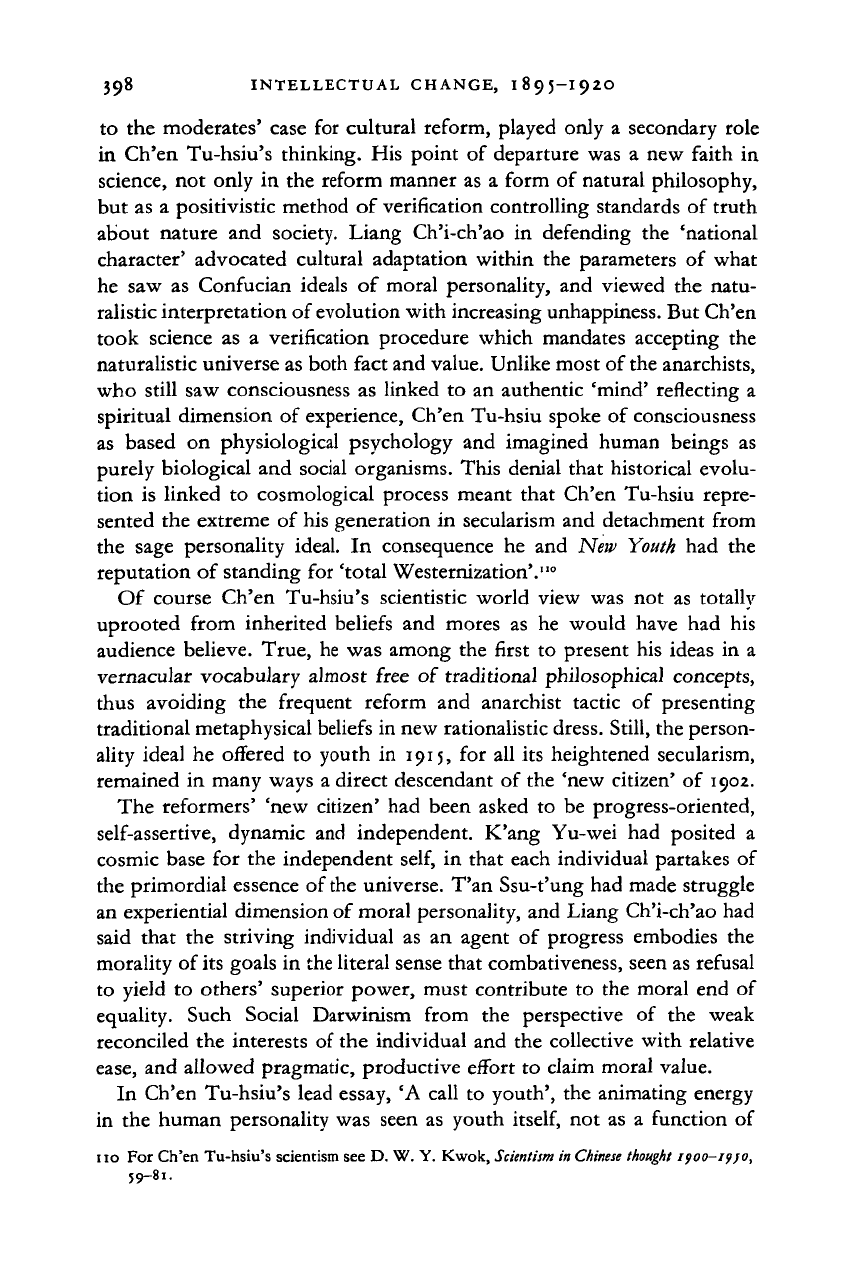
398 INTELLECTUAL CHANGE, 1895-I92O
to the moderates' case for cultural reform, played only
a
secondary role
in Ch'en Tu-hsiu's thinking. His point
of
departure was
a
new faith
in
science, not only in the reform manner as
a
form of natural philosophy,
but as
a
positivistic method of verification controlling standards of truth
about nature and society. Liang Ch'i-ch'ao
in
defending the 'national
character' advocated cultural adaptation within the parameters
of
what
he saw as Confucian ideals
of
moral personality, and viewed the natu-
ralistic interpretation of evolution with increasing unhappiness. But Ch'en
took science
as a
verification procedure which mandates accepting the
naturalistic universe as both fact and value. Unlike most of the anarchists,
who still saw consciousness as linked to an authentic 'mind' reflecting
a
spiritual dimension of experience, Ch'en Tu-hsiu spoke of consciousness
as based
on
physiological psychology and imagined human beings
as
purely biological and social organisms. This denial that historical evolu-
tion
is
linked
to
cosmological process meant that Ch'en Tu-hsiu repre-
sented the extreme of his generation in secularism and detachment from
the sage personality ideal.
In
consequence
he
and New Youth had the
reputation of standing for 'total Westernization'.
110
Of course Ch'en Tu-hsiu's scientistic world view was not as totally
uprooted from inherited beliefs and mores
as he
would have had
his
audience believe. True, he was among the first to present his ideas in
a
vernacular vocabulary almost free of traditional philosophical concepts,
thus avoiding
the
frequent reform and anarchist tactic
of
presenting
traditional metaphysical beliefs in new rationalistic dress. Still, the person-
ality ideal he offered
to
youth in 1915, for all its heightened secularism,
remained in many ways a direct descendant of the 'new citizen'
of
1902.
The reformers' 'new citizen' had been asked
to
be progress-oriented,
self-assertive, dynamic and independent. K'ang Yu-wei had posited
a
cosmic base for the independent
self,
in that each individual partakes of
the primordial essence of the universe. T'an Ssu-t'ung had made struggle
an experiential dimension of moral personality, and Liang Ch'i-ch'ao had
said that the striving individual
as an
agent
of
progress embodies the
morality of its goals in the literal sense that combativeness, seen as refusal
to yield
to
others' superior power, must contribute to the moral end of
equality. Such Social Darwinism from
the
perspective
of the
weak
reconciled the interests of the individual and the collective with relative
ease,
and allowed pragmatic, productive effort to claim moral value.
In Ch'en Tu-hsiu's lead essay, 'A call to youth', the animating energy
in the human personality was seen as youth
itself,
not as
a
function of
no For Ch'en Tu-hsiu's scientism see D. W. Y. Kwok, Scientism in
Chinese thought
1900-19
jo,
59-81.
Cambridge Histories Online © Cambridge University Press, 2008
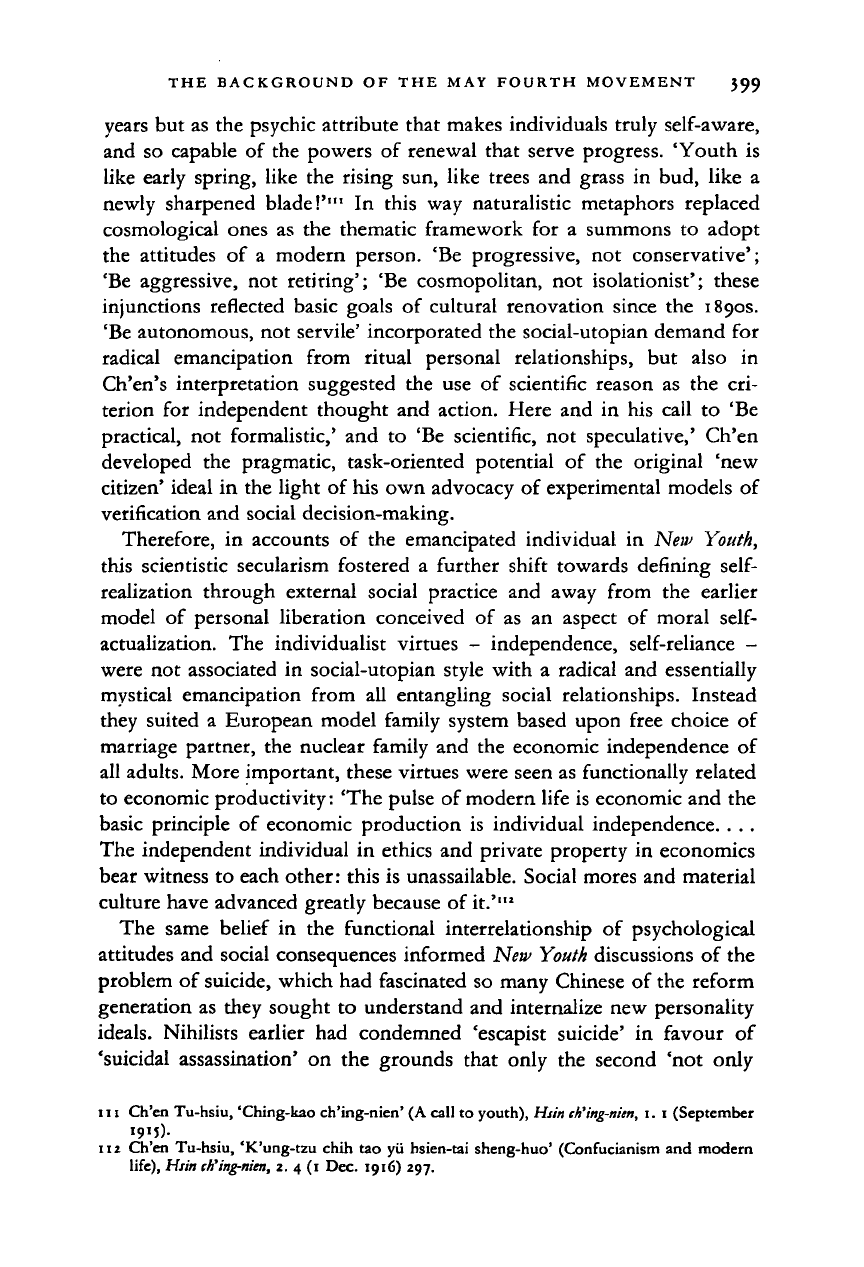
THE
BACKGROUND
OF THE MAY
FOURTH MOVEMENT
399
years but as the psychic attribute that makes individuals truly self-aware,
and so capable of the powers of renewal that serve progress. 'Youth is
like early spring, like the rising sun, like trees and grass in bud, like a
newly sharpened blade!'
1
" In this way naturalistic metaphors replaced
cosmological ones as the thematic framework for a summons to adopt
the attitudes of a modern person. 'Be progressive, not conservative';
'Be aggressive, not retiring'; 'Be cosmopolitan, not isolationist'; these
injunctions reflected basic goals of cultural renovation since the 1890s.
'Be autonomous, not servile' incorporated the social-utopian demand for
radical emancipation from ritual personal relationships, but also in
Ch'en's interpretation suggested the use of scientific reason as the cri-
terion for independent thought and action. Here and in his call to 'Be
practical, not formalistic,' and to 'Be scientific, not speculative,' Ch'en
developed the pragmatic, task-oriented potential of the original 'new
citizen' ideal in the light of his own advocacy of experimental models of
verification and social decision-making.
Therefore, in accounts of the emancipated individual in New Youth,
this scientistic secularism fostered a further shift towards defining
self-
realization through external social practice and away from the earlier
model of personal liberation conceived of as an aspect of moral
self-
actualization. The individualist virtues - independence, self-reliance -
were not associated in social-utopian style with a radical and essentially
mystical emancipation from all entangling social relationships. Instead
they suited a European model family system based upon free choice of
marriage partner, the nuclear family and the economic independence of
all adults. More important, these virtues were seen as functionally related
to economic productivity: 'The pulse of modern life is economic and the
basic principle of economic production is individual independence. . . .
The independent individual in ethics and private property in economics
bear witness to each other: this is unassailable. Social mores and material
culture have advanced greatly because of it.'"
2
The same belief in the functional interrelationship of psychological
attitudes and social consequences informed New Youth discussions of the
problem of suicide, which had fascinated so many Chinese of the reform
generation as they sought to understand and internalize new personality
ideals.
Nihilists earlier had condemned 'escapist suicide' in favour of
'suicidal assassination' on the grounds that only the second 'not only
in
Ch'en
Tu-hsiu,
'Ching-kao
ch'ing-nien' (A
call
to youth),
Hsin
ch'ing-nien,
1. 1
(September
)
112
Ch'en
Tu-hsiu,
'K'ung-tzu chih
tao yii
bsien-tai
sheng-huo'
(Confucianism
and
modern
life),
Hsin
ch'ing-nien,
2. 4 (1 Dec. 1916) 297.
Cambridge Histories Online © Cambridge University Press, 2008
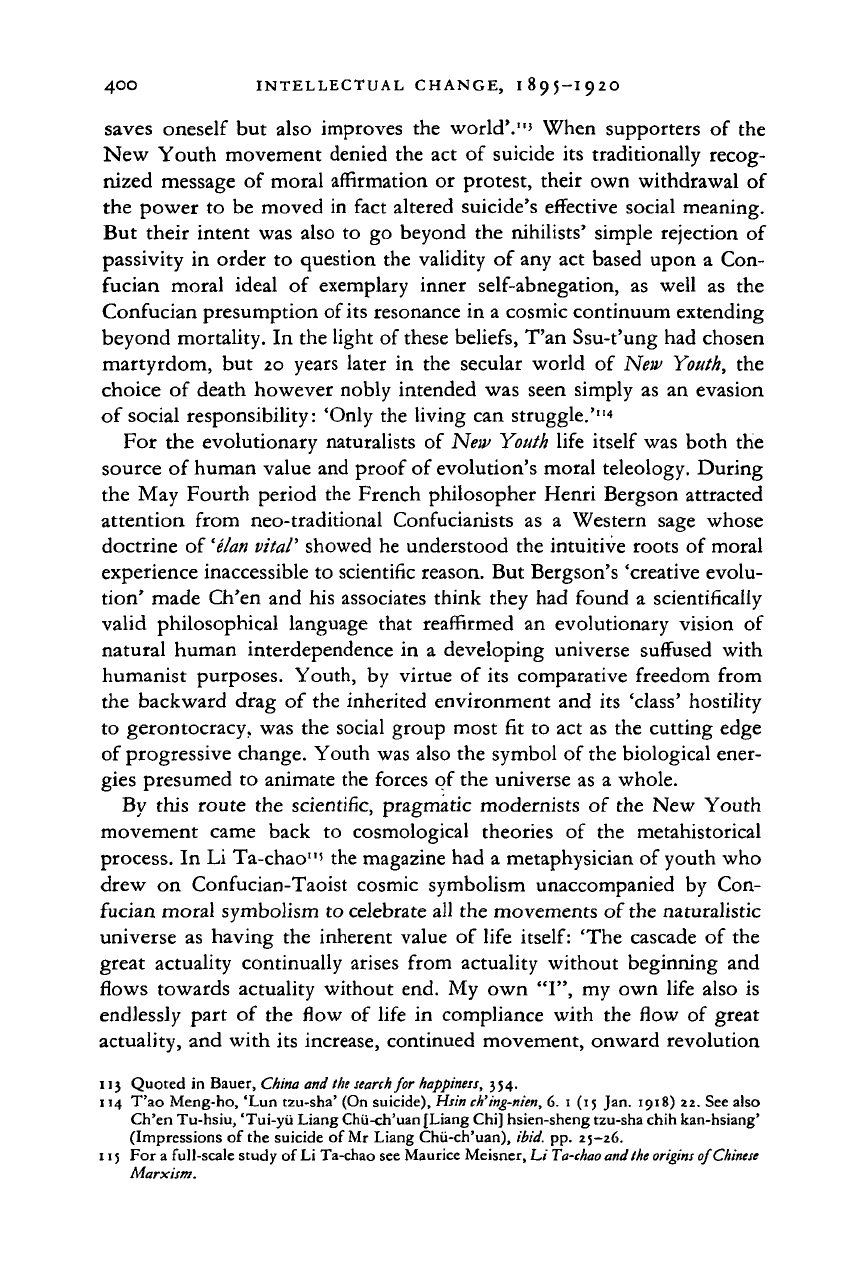
4OO INTELLECTUAL CHANGE, 1895-I92O
saves oneself but also improves the world'."' When supporters of the
New Youth movement denied the act of suicide its traditionally recog-
nized message of moral affirmation or protest, their own withdrawal of
the power to be moved in fact altered suicide's effective social meaning.
But their intent was also to go beyond the nihilists' simple rejection of
passivity in order to question the validity of any act based upon a Con-
fucian moral ideal of exemplary inner self-abnegation, as well as the
Confucian presumption of
its
resonance in a cosmic continuum extending
beyond mortality. In the light of these beliefs, T'an Ssu-t'ung had chosen
martyrdom, but 20 years later in the secular world of New Youth, the
choice of death however nobly intended was seen simply as an evasion
of social responsibility: 'Only the living can struggle.'"
4
For the evolutionary naturalists of New Youth life itself was both the
source of human value and proof of evolution's moral teleology. During
the May Fourth period the French philosopher Henri Bergson attracted
attention from neo-traditional Confucianists as a Western sage whose
doctrine of
'elan
vital' showed he understood the intuitive roots of moral
experience inaccessible to scientific reason. But Bergson's 'creative evolu-
tion' made Ch'en and his associates think they had found a scientifically
valid philosophical language that reaffirmed an evolutionary vision of
natural human interdependence in a developing universe suffused with
humanist purposes. Youth, by virtue of its comparative freedom from
the backward drag of the inherited environment and its 'class' hostility
to gerontocracy, was the social group most fit to act as the cutting edge
of progressive change. Youth was also the symbol of the biological ener-
gies presumed to animate the forces of the universe as a whole.
By this route the scientific, pragmatic modernists of the New Youth
movement came back to cosmological theories of the metahistorical
process. In Li Ta-chao"
!
the magazine had a metaphysician of youth who
drew on Confucian-Taoist cosmic symbolism unaccompanied by Con-
fucian moral symbolism to celebrate all the movements of the naturalistic
universe as having the inherent value of life
itself:
'The cascade of the
great actuality continually arises from actuality without beginning and
flows towards actuality without end. My own "I", my own life also is
endlessly part of the flow of life in compliance with the flow of great
actuality, and with its increase, continued movement, onward revolution
113 Quoted in Bauer, China and
the
search for
happiness,
354.
114 T'ao Meng-ho, 'Lun tzu-sha' (On suicide), Hsin
ch'ing-nien,
6. 1 (15 Jan. 1918) 22. See also
Ch'en Tu-hsiu, 'Tui-yu Liang Chii-ch'uan [Liang Chi] hsien-sheng tzu-sha chih kan-hsiang'
(Impressions of the suicide of Mr Liang Chu-ch'uan),
ibid.
pp. 25-26.
115 For a full-scale study of Li Ta-chao see Maurice Meisner, Li
Ta-chao
and
the origins
of Chinese
Marxism.
Cambridge Histories Online © Cambridge University Press, 2008
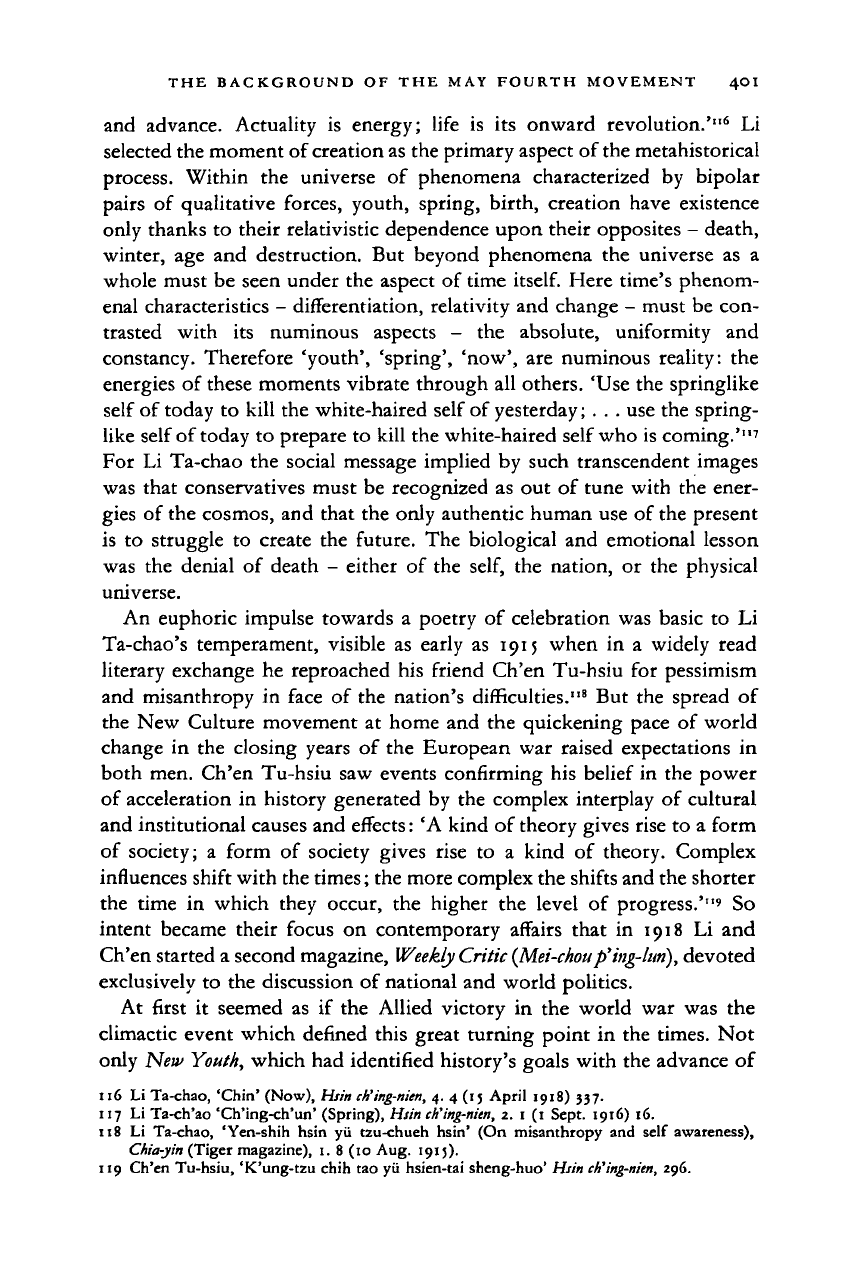
THE BACKGROUND
OF THE MAY
FOURTH MOVEMENT
4OI
and advance. Actuality
is
energy; life
is its
onward revolution.'"
6
Li
selected
the
moment
of
creation as
the
primary aspect
of
the
metahistorical
process. Within
the
universe
of
phenomena characterized
by
bipolar
pairs
of
qualitative forces, youth, spring, birth, creation have existence
only thanks
to
their relativistic dependence upon their opposites
-
death,
winter,
age and
destruction.
But
beyond phenomena
the
universe
as a
whole must
be
seen under
the
aspect
of
time
itself.
Here time's phenom-
enal characteristics
-
differentiation, relativity
and
change
-
must
be con-
trasted with
its
numinous aspects
- the
absolute, uniformity
and
constancy. Therefore 'youth', 'spring', 'now',
are
numinous reality:
the
energies
of
these moments vibrate through
all
others.
'Use the
springlike
self
of
today
to
kill
the
white-haired self
of
yesterday;
. . . use the
spring-
like self
of
today
to
prepare
to
kill
the
white-haired self who
is
coming.'"
7
For
Li
Ta-chao
the
social message implied
by
such transcendent images
was that conservatives must
be
recognized
as out of
tune with
the
ener-
gies
of the
cosmos,
and
that
the
only authentic human
use of the
present
is
to
struggle
to
create
the
future.
The
biological
and
emotional lesson
was
the
denial
of
death
-
either
of the self, the
nation,
or the
physical
universe.
An euphoric impulse towards
a
poetry
of
celebration
was
basic
to Li
Ta-chao's temperament, visible
as
early
as 1915
when
in a
widely read
literary exchange
he
reproached
his
friend Ch'en Tu-hsiu
for
pessimism
and misanthropy
in
face
of the
nation's difficulties."
8
But the
spread
of
the
New
Culture movement
at
home
and the
quickening pace
of
world
change
in the
closing years
of the
European
war
raised expectations
in
both
men.
Ch'en Tu-hsiu
saw
events confirming
his
belief
in the
power
of acceleration
in
history generated
by the
complex interplay
of
cultural
and institutional causes
and
effects:
'A
kind
of
theory gives rise
to a
form
of society;
a
form
of
society gives rise
to a
kind
of
theory. Complex
influences shift with
the
times;
the
more complex
the
shifts
and the
shorter
the time
in
which they occur,
the
higher
the
level
of
progress.'"
9
So
intent became their focus
on
contemporary affairs that
in 1918 Li and
Ch'en started
a
second magazine,
Weekly Critic
(Mei-choup'ing-lun),
devoted
exclusively
to the
discussion
of
national
and
world politics.
At first
it
seemed
as if the
Allied victory
in the
world
war was the
climactic event which defined this great turning point
in the
times.
Not
only
New
Youth,
which
had
identified history's goals with
the
advance
of
116
Li
Ta-chao, 'Chin' (Now), Hsin
ch'ing-men,
4. 4 (15
April
1918) 337.
117
Li
Ta-ch'ao 'Ch'ing-ch'un' (Spring), Hsin
ch'ing-men,
2. 1 (1
Sept.
1916) 16.
118
Li
Ta-chao, 'Yen-shih hsin
yii
tzu-chueh hsin'
(On
misanthropy
and
self awareness),
Chia-yin
(Tiger magazine),
1. 8 (10 Aug.
1915).
119 Ch'en Tu-hsiu, 'K'ung-tzu chih
tao yii
hsien-tai sheng-huo' Hsin
ch'ing-men,
296.
Cambridge Histories Online © Cambridge University Press, 2008

4O2 INTELLECTUAL CHANGE, 1895-192O
Western democracy
and
science,
but all
Chinese aware
of
the Wilsonian
programme
of
self-determination expected the Allied victory to reverse the
recent course
of
imperialist encroachments
on
China's sovereignty.
But
Li Ta-chao's
1918
salute
to the
Bolshevik Revolution turned
out to be
more significant. When he greeted
the
new year
of
1919
as the
dawn
of
a
'new era'
{hsin
chi-yuati),
drawing upon the historical symbolism
of
renewal
implied
by a
change
of
reign titles,
Li
made clear that
the
pattern
of
pro-
gress
he now
foresaw would
be
generated
by
systems
of
economic
production
as
Marx foretold:
From
now on all
know that productive systems
can be
reformed, national
boundaries can be as
if
struck down, and human kind can all enjoy opportuni-
ties
for
work,
and
that
all
kinds
of
sorrow, hardship, anxiety, strife,
can all
naturally vanish.
. . .
Now
the
productive system
is
giving rise
to a
great
movement.
The
united working class
and
their comrades
all
over
the
world
will make rational production unions, break down national barriers and over-
throw
the
world capitalist class
. .
. these
are the
glories
of
our new era! Like
ice exposed
to
spring sun, in the light
of
these glories the evils
of
the past will
gradually melt away,
the
residues
of
history will
as
leaves blown
by
autumn
wind fall
to
the ground.
120
The interest
in
Marxism which spread rapidly among radical Chinese
in
1919 and 1920 was
stimulated
by the
same disillusionment with
the
victorious liberal democracies that prompted neo-traditionalists
to
unite
behind
a
post-war critique
of the
'materialistic West'.
The
Versailles
Treaty, then,
on all
sides became
a
catalyst stimulating re-evaluation
of
the reform model
of
the West which had so powerfully influenced a whole
generation's vision
of
Chinese
and
world progress.
The
trauma
of
repub-
lican politics,
the
First World
War and
China's betrayal
at the
Peace
Conference made Liang Ch'i-ch'ao abandon faith
in the
moral teleology
of evolution. Ch'en Tu-hsiu,
who
(through
the war) had
identified
the
Allied cause with
the
ideals
of
justice,
in 1919
found
the
shock
of the
Versailles Treaty compounded
by a
five-month stay
in
prison
for
his role
in
the May
Fourth demonstrations against
it. By the
middle
of 1920
Ch'en
was
totally committed
to the new
revolutionary social science
of
Marxism. From
all
sides
of the
ideological spectrum many followed
the
direction
of
either Liang
or
Ch'en, giving vent
to a
criticism
of
the liberal
West
all the
stronger
for
having been
so
long unexpressed.
For a
whole
generation Chinese committed
to
their own national revival according
to
a pattern
of
world progress
had
tended
to
mask
one of the two
Janus
faces
the
West presented
to
China. Either they
had
compartmentalized
their anger
at
violations
of
Chinese sovereignty, dealing with these
on a
120
Li
Ta-chao, 'Hsin chi-yuan'
(A
new era),
Mei-chou
p'ing-lun
(15
Jan.
1919).
Cambridge Histories Online © Cambridge University Press, 2008
